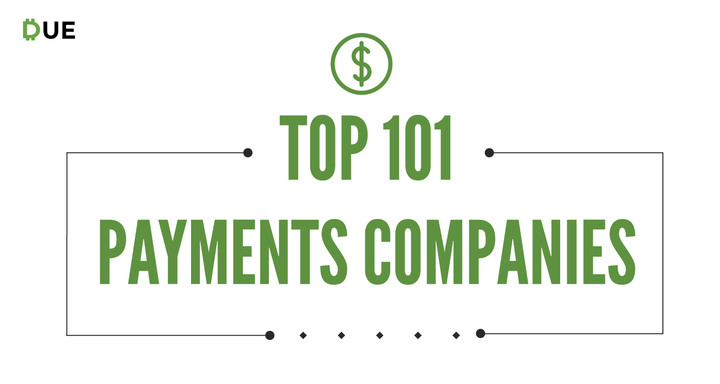Today’s freelancers, startups, and small businesses as well as mid to large-size companies have more choices than ever when it comes to receiving credit card payments from consumers and other businesses.
We like to see how Due.com stacks up against our payment competition. Due.com vs our competition is one of the best ways that we can find out how to be better and make you the very best product available. It’s our goal and everything we strive to do.
Here is a list of 101 credit card and payment processing companies that offer a wide range of technology like blockchain, payment solutions, platforms, and tools that can help increase your cash flow and drive more revenues for your offline or online business. Now you can accept credit cards online and we’ve made it easy by detailing our how we stack up to our competition.
Here are the top 101 payment processing companies:

Obviously we’d put ourselves first as we believe we’re the best, lowest cost and most flexible credit card payment processor in the World. Due is a payments company that offers online invoicing, payment acceptance through ACH, digital wallet, and domestic payments and international credit card processing — all with documented, world-class customer service.

2Checkout is a leading global payment platform that allows companies to accept online and mobile payments from buyers worldwide with localized payment options. Capabilities include a pre-integrated payments gateway, merchant account, PCI compliance, international fraud prevention, and integration with more than 100 shopping carts.
2Checkout vs. Due: Both Due and 2Checkout offer payment processing solutions for companies of all sizes. In addition they both offer a hosted checkout and a payment processing API. 2Checkout operates across borders while Due only operates in the United States for now. For transactions in the United States, 2Checkout charges 2.9% +$0.30 per successful transaction. Due charges 2.8% flat for credit cards. In addition, Due offers invoicing, time tracking, project management, and much more completely free of charge.
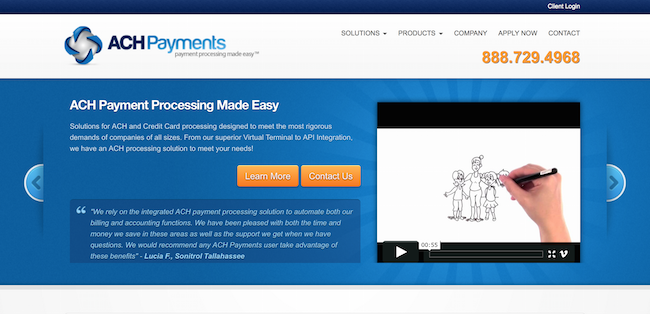
ACH Payments offers web-based ACH and credit card processing for companies, including virtual terminals and API integration.
ACH Payments vs. Due: Both Due and ACH Payments offer online payment processing solutions for companies of all sizes. In addition they both offer a hosted checkout and a payment processing API. ACH Payments offers POS hardware for computers, while Due does not yet have that functionality. Depending on your payment processing solutions, processing fees for ACH payments can get a bit expensive. Due offers the lowest credit card processing rates in the industry at 2.8% flat. Depending on volume, Due offers rates below 2.8% no hidden or monthly fees. In addition, Due offers features such as invoicing, time tracking, project management, and much more completely free of charge.
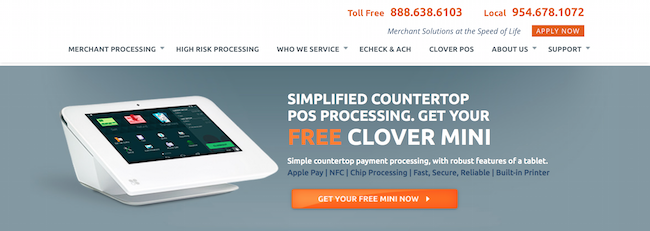
Aliant Payments is a credit card processing and independent merchant services provider, working in conjunction with the world’s leader in credit card and payment processing. It made our top payment processing companies list this year. Aliant Payments has solutions for specific industries as well. Whether you’re a grocery store or a gas station, you can pick a custom solution from tons of payment industry-specific options.
Aliant Payments vs. Due: Both Due and Aliant Payments offer payment processing solutions for companies of all sizes. In addition, they both offer a payment processing API for e-commerce businesses. Depending on your payment processing solutions, processing fees for Aliant Payments can get a bit expensive. Due offers the lowest credit card processing rates in the industry at 2.8% flat. Depending on volume, Due offers rates below 2.8%, no hidden or monthly fees. In addition, Due offers features such as invoicing, time tracking, project management, digital wallet and much more completely free of charge.

Amazon Payments offers a way to grow a business and engage with Amazon’s customers across desktop, tablet, and mobile platforms. A consumer can use their stored account and payment information on Amazon to pay directly on a merchant’s website.
Amazon Payments vs. Due: Both Due and Amazon Payments offer payment processing solutions for companies of all sizes. Amazon Payments offers much more extensions and plug-ins for your e-commerce platform than Due at the moment. However, Due offers the lowest credit card processing rates in the industry at 2.8% flat. Depending on volume, Due offers rates below 2.8% no hidden or monthly fees. In addition, Due offers features such as invoicing, time tracking, project management, and much more completely free of charge.

American Express Serve is a prepaid debit card that provides for 1% cash back in stores and online. It offers free ATM withdrawls, fraud protection, and mobile access.
American Express Serve vs. Due: American Express focuses more on credit card solutions for individuals and larger enterprises. Due offers a hosted checkout and payment processing API for e-commerce busineses. Due offers the lowest credit card processing rates in the industry at 2.8% flat. Depending on volume, Due offers rates below 2.8% no hidden or monthly fees. In addition, Due offers features such as invoicing, time tracking, project management, and much more completely free of charge.

Android Pay is a way to make payments from an Android smartphone for in-store and in-app purchases. Phones can be unlocked and placed near a contactless terminal to pay in a store or used at checkout within an app. It can also be used to track purchases and store payment information in a secure, convenient way.
Android Pay vs. Due: Android Pay is mainly targeted to everyday Android users. Like Due, Android Pay allows you to link your credit or debit card and make purchases from your device. Due provides payment services to both everyday consumers as well as businesses. With Due, you can use our payment processing API and access our hosted checkout for your e-commerce businesses. Soon, Due will offer payment processing options for POS purchases. In addition, Due offers features such as invoicing, time tracking, project management, and much more completely free of charge.

Apple Pay is a safe and convenient way to pay for merchandise by using an Apple device like an Apple Watch or iPhone. Simply hold your phone over the payment portal and tap the home button to authorize the payment. With Apple Pay you’ll no longer need to carry around all of your credit and debit cards, store them all on your device and choose whichever card you prefer at the point of sale.
Apple Pay vs. Due: Apple Pay is mainly targeted to everyday Android users. Like Due, Apple Pay allows you to link your credit or debit card and make purchases from your device. Due provides payment services to both everyday consumers as well as businesses. With Due, you can use our payment processing API and access our hosted checkout for your e-commerce businesses. Soon, Due will offer payment processing options for POS purchases. In addition, Due offers features such as invoicing, time tracking, project management, and much more completely free of charge.

Ariba Pay is a B2B payments solution that combines the delivery of funds settlement with the rich, line-level remittance detail that your suppliers need to reconcile and post payments.
Ariba Pay vs. Due: Ariba Pay allows users to send and receive funds electronically and securely. Ariba Pay is partnered with Discover Network and is a great way to securely manage your bank information and move money. Due provides payment services to both everyday consumers as well as businesses. With Due, you can use our payment processing API and access our hosted checkout for your e-commerce businesses. Soon, Due will offer payment processing options for POS purchases. In addition, Due offers features such as invoicing, time tracking, project management, and much more completely free of charge.

Authorize.net offers online and mobile merchant solutions as well as telephone and mail order merchant solutions.
Authorize.net vs. Due: Both Authorize.net and Due are online payment companies that offer similar payment capabilities. Both platforms offer credit card processing, e-checks, online payments, and recurring billing. Authorize.net offers in-store payments while Due does not yet have POS capabilities. The main difference is pricing. Authorize.net charges $49 for setup, $25/month for the payment gateway, and $2.9% + $0.30 per transaction. Due offers the lowest credit card processing rates in the industry at 2.8% flat. Depending on volume, Due offers rates below 2.8% no hidden or monthly fees. In addition, Due offers features such as invoicing, time tracking, project management, and much more completely free of charge.
![]()
Beacon Payments offers the ability to accept mobile wallet payments, including NFC, EMV, and QR code payments to businesses of all sizes.
Beacon Payments vs. Due: Both Beacon Payments and Due are similar payment companies — with a couple distinctive differences. Both platforms offer credit card processing, e-checks, online payments, and recurring billing. Beacon Payments offers in-store payments and gift/loyalty card services while Due does not yet have these features. Due offers the lowest credit card processing rates in the industry at 2.8% flat. Depending on volume, Due offers rates below 2.8% no hidden or monthly fees. In addition, Due offers features such as invoicing, time tracking, project management, and much more completely free of charge.

Bell ID is a recognized leader in mobile payments. The technologies created by Bell ID include a full suite of mobile payment solutions that support cloud-based services using host card emulation (HCE), EMVCo tokenization (TSP), trusted services management (TSM) for SIM-based projects and embedded secure element solutions.
Bell ID vs. Due: Bell ID focuses mostly on mobile payments, allowing users to pay for products with their mobile devices (HCE), and tokenization. Due offers payment processing options for businesses of all sizes. Due offers a hosted checkout for e-commerce businesses with credit card processing rates starting at 2.8% flat or lower. In addition, Due offers features such as invoicing, time tracking, project management, and much more completely free of charge.

Best Card Payments provides businesses of all sizes access to credit card processing, business loans, gift cards and more.
Best Card Payments vs. Due: Both Due and Best Card Payments offer very similar payment features. Both platforms offer credit card processing, recurring payments, and online invoicing. Best Card Payments offers point of sale processing which Due does not yet offer. As far as pricing goes, Best Card Payments claims to have competitive rates, you will need to submit a quote to inquire about these rates. Due guarantees the lowest rates in the industry starting at 2.8% flat or lower, no per transaction or monthly fees. In addition, Due offers features such as, time tracking, digital wallet, project management, and much more completely free of charge.
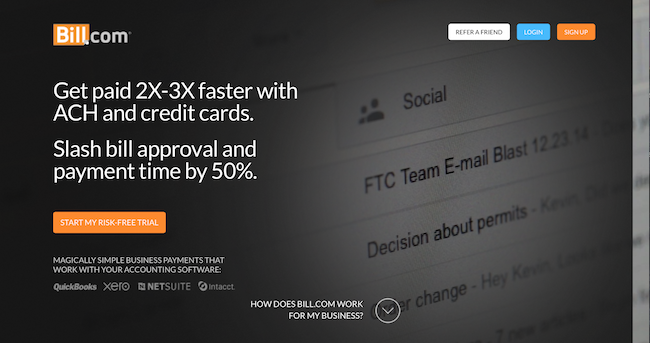
Bill.com is the leading digital business payments company creating magically simple A/P and A/R solutions.
Bill.com vs. Due: Bill.com allows you to send bills either by mail or electronically. Then they’re software automatically handles the rest of the payment process from there, paying your bills directly and then syncs with your accounting software. Due offers payment processing services for businesses of all sizes. We have an e-commerce API that offers a hosted checkout for any online business. Due offers credit card processing rates as low as 2.8% or lower depending on volume. In addition, Due offers features such as invoicing, time tracking, digital wallet, project management, and much more completely free of charge.

Bitcoin is an alternative way to make payments and conduct transactions.
Bitcoin vs. Due: Bitcoin is a crypto-currency that has truly revolutionized the online payments industry. Bitcoin is a very secure way to make and receive payments online. If you want to make and receive purchases via Bitcoin you must choose a Bitcoin Wallet to store your bitcoin, and access a Bitcoin exchange to buy and sell your Bitcoin. Due actually allows it’s users to make and receive payments using Bitcoin. Due offers a much wider variety of features, such as payment processing, invoicing, digital wallet, time tracking, project management, and much more.
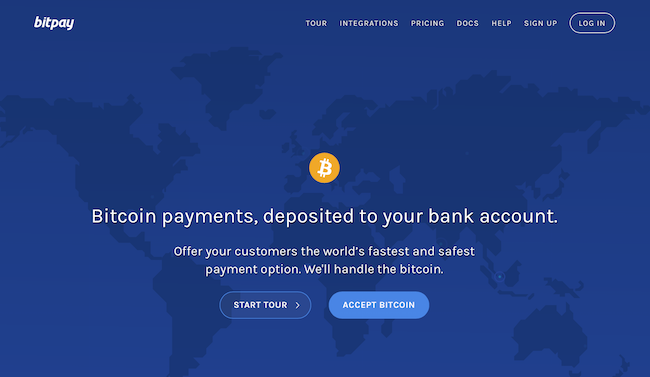
Bitpay enables bitcoin payments to be deposited into a bank account and be used to pay for products and services.
Bitpay vs. Due: Bitpay essentially lets users buy and sell products using bitcoin and offers FIAT settlement into nearly all the most popular currencies. Due actually allows it’s users to make and receive payments using Bitcoin. Due offers a much wider variety of features, such as payment processing, a hosted checkout for online businesses, invoicing, digital wallet, time tracking, project management, and much more.

Blue Dog Business Services is a credit card processing company for small businesses in over 200 countries, EMV and moblle wallet processing, Apple Pay processing, e-commerce processing, mobile solutions, gift card solutions, and ACH and check conversion. They also provide a range of marketing and analytics services.
Blue Dog Business Services vs. Due: Both Due and Blue Dog Business Services offer very similar payment features. Both platforms offer credit card processing, an commerce payment checkout, and ACH payments. Blue Dog Business Services offers point of sale processing which Due does not yet offer. As far as pricing goes, Blue Dog Business Services claims to have competitive rates, you will need to submit a quote to inquire about these rates. Due guarantees the lowest rates in the industry starting at 2.8% flat or lower, no per transaction or monthly fees. In addition, Due offers features such as, time tracking, digital wallet, project management, and much more completely free of charge.
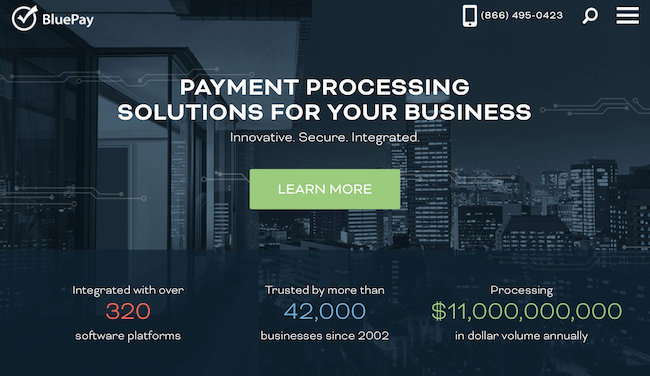
BluePay has a number of payment solutions, including batch processing, large ticket processing, mobile credit card processing, POS systems, e-commerce and more.
BluePay vs. Due: Both BluePay and Due offer credit card processing solutions for businesses of all sizes. BluePay offers both e-commerce and point of sale solutions while Due only offers an e-commerce solution for now. Due offers the lowest credit card processing rates in the industry at 2.8% flat. Depending on volume, Due offers rates below 2.8% no hidden or monthly fees. In addition, Due offers features such as invoicing, time tracking, project management, and much more completely free of charge.

Bluepoint Solutions provides end-to-end payment processing and content management solutions to financial institutions nationwid for B2B, B2G, enterprise, and small and medium businesses across all industries.
Bluepoint Solutions vs. Due: Bluepoint Solutions focuses mainly on check payment processing and image capture for any relevant financial documents. Due offers payment processing solutions for businesses of all sizes including a hosted checkout for online businesses. Depending on volume, Due offers rates below 2.8% no hidden or monthly fees. In addition, Due offers features such as invoicing, time tracking, project management, and much more completely free of charge.

Boku is operational in over 60 markets and can process payment requests from over 4 billion phones, making it the largest independent carrier billing company in the world.
Boku vs. Due: Boku focuses on mobile payment processes for businesses of all sizes. Both Due and Boku offer a hosted checkout for web based merchants. Boku only provides mobile payment options while Due provides both. In addition, Due offers features such as, time tracking, digital wallet, project management, and much more completely free of charge.

Braintree is a payments company that offers global commerce tools in order to accept payment across any device and through almost every payment methods. It works with 130 currencies across 40 countries.
Braintree vs. Due: Both Braintree and Due allow businesses of all sizes to utilize their payment processing capabilities. Both platforms offer a hosted checkout experience for online businesses, Braintree allows you to choose a standard checkout flow or customize your own. At the moment, Due only offers a standard checkout flow. Both services charge a flat fee with no monthly or hidden costs. Both platforms also allow you to integrate with PayPal and Bitcoin. Braintree charges 2.9% + $0.30 per transaction while Due charges 2.8% flat or lower depending on volume. In addition, Due offers features such as, time tracking, digital wallet, project management, and much more completely free of charge.

CardConnect helps over 50,000 merchants across the U.S. with credit card transactions through its patented tokenization, P2PE Ceritfication, and gateway solutions. They assist with electronic payments, including automatic deposits and online monitoring.
CardConnect vs. Due: Both CardConnect and Due offer payment processing solutions for businesses of all sizes. Both platforms also offer a payment processing API that allows online businesses to process credit and debit cards. Due offers the lowest credit card processing rates in the industry at 2.8% flat. Depending on volume, Due offers rates below 2.8% no hidden or monthly fees. In addition, Due offers features such as invoicing, time tracking, project management, and much more completely free of charge.

Cashworx is a nationwide ATM/POS provider for many Fortune 500 companies.
Cashworx vs. Due: Cashworx offers point of sale and ATM credit card processor solutions. Due does not offer point of sale payment processing at the moment. Due offers a hosted checkout for online businesses with credit card processing rates starting at 2.8% or lower. In addition, Due offers features such as invoicing, time tracking, project management, digital wallet, and much more completely free of charge.

Cayan is the leading provider of payment technologies that give businesses a competitive advantage, including simple and reliable payment processing as well as fully integrated, multi-channel Customer Engagement Platform solution.
Cayan vs. Due: Both Cayan and Due offer credit card processing solutions for businesses of all sizes. Cayan offers both e-commerce and point of sale solutions while Due only offers an e-commerce solution for now. Due offers the lowest credit card processing rates in the industry at 2.8% flat. Depending on volume, Due offers rates below 2.8% no hidden or monthly fees. In addition, Due offers features such as invoicing, time tracking, project management, and much more completely free of charge.

Central Payment offers retailers and all types of companies payment equipment solutions like POS terminal, mobile and wireless along with two payment gateway options that include PayHub and Authorize.net.
Central Payment vs. Due: Both Central Payment and Due offer credit card processing solutions for businesses of all sizes. Central Payment offers POS payment processing via Verifone hardware, while Due only offers e-commerce processing solutions. Due offers the lowest credit card processing rates in the industry at 2.8% flat. Depending on volume, Due offers rates below 2.8% no hidden or monthly fees. In addition, Due offers features such as invoicing, time tracking, project management, and much more completely free of charge.

Certified Payment Processing focuses on serving small businesses with affordable payment processing solutions. They offer debit and credit card processing, check conversion and guarantee, gift and loyalty card processing, mobile payments, ecommerce solutions, ATM processing, EBT card processing and more.
Certified Payment Processing vs. Due: Both Certified Payment Processing and Due offer credit card processing solutions for businesses of all sizes. Certified Payment Processing offers both e-commerce and point of sale solutions while Due only offers an e-commerce solution for now. Due offers the lowest credit card processing rates in the industry at 2.8% flat. Depending on volume, Due offers rates below 2.8% no hidden or monthly fees. In addition, Due offers features such as invoicing, time tracking, project management, and much more completely free of charge.

Chase Paymentech offers a complete payment and credit card processing service for businesses that includes credit card processing, NFC payments, Apple Pay, recurring payments, international payments, electronic checks, PayPal, online and mobile payments, POS systems, and credit card machines.
Chase Paymentech vs. Due: Chase Paymentech and Due both offer credit card processing services, e-checks, paypal integration, online and mobile payments, as well as recurring payments. Chase Paymentech offers international payments and POS systems which are on Due’s roadmap but not yet available. However, Due offers the lowest credit card processing rates in the industry at 2.8% flat. Depending on volume, Due offers rates below 2.8% no hidden or monthly fees. In addition, Due offers features such as invoicing, time tracking, project management, digital wallet, and much more completely free of charge.

Circle allows people to send money by email or text to a debit or credit card or a bank account. It is available on iOS and Android.
Circle vs. Due: Both Circle and Due allow you to link a credit card or debit card to your account and send and receive payments on the platform. Circle is mainly used for sharing small amounts of money with friends or your “circle”. Due is focused more on providing business tools for freelancers and businesses of all sizes. Due offers features such as payment processing, time tracking, digital wallet, project management, invoicing, and much more.

Circle Plus Payments allows people to accept credit card payments and Bitcoin transactions on their Android and iOS smartphones anywhere in the world.
Circle Plus Payments vs. Due: Circle Plus Payments solely allows users to accept credit and debit card and bitcoin transactions through their smartphones in over 23 different countries. Circle Plus Payments is integrated with Stripe Connect and charges 2.9% + $0.30 per successful transaction, they do not sell merchant accounts or perform any actual transactions for you. Due offers a hosted checkout that will perform transactions for your online business, and eventually for point of sale terminals. Due charges a flat 2.8% fee or lower depending on volume. In addition, Due offers features such as payment processing, time tracking, digital wallet, project management, invoicing, and much more.

Clearxchange is owned by top banks and is the first U.S. digital payments network that helps get payments directly to bank accounts without any third-party involvement through bank website and apps.
Clearxchange vs. Due: Clearxchange is basically a middle-man in facilitating transactions between banks. Through your Clearxchange account you can send money to friends by using their phone number or email address. Due also allows you to send and receive money by connecting your bank account. In addition, Due offers features such as payment processing, time tracking, digital wallet, project management, invoicing, and much more.

Clover offers a wide range of POS solutions, payment platforms, and marketing tools like online store development and gift cards.
Clover vs. Due: Both Clover and Due offer online credit card processing capabilities. Clover offers various POS systems while Due does not yet have this functionality. Clover allows businesses to make their own “online stores” through various templates. Due allows you to integrate a hosted checkout to your already existing e-commerce platform to start accepting payments. In addition, Due offers features such as time tracking, digital wallet, project management, invoicing, and much more.

Cornerstone Merchant Solutions offers equipment and solutions for merchants, retailers, and other businesses, including EMV, merchant accounts, and a payment gateway.
Cornerstone Merchant Solutions vs. Due: Both Cornerstone Merchant Solutions and Due offer payment processing options for businesses of all sizes. Cornerstone Merchant Solutions offers a payment gateway while Due offers a hosted checkout for online businesses. In addition, Due offers features such as time tracking, digital wallet, project management, invoicing, and much more completely free of charge.
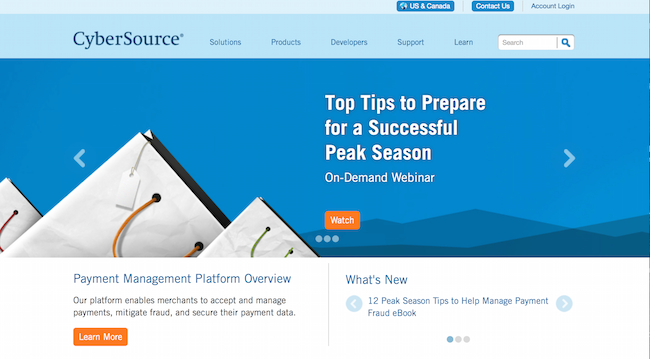
CyberSource provides all types of payment and merchant solutions, including recurring biling, direct debit payments, digital wallet and digital payment services, cross-channel payments, the ability to connect with 100 processors around the world and accept cards from over 190 countries, and payer authentication.
CyberSource vs. Due: Both CyberSource and Due allow you to access features such as payment processing, digital wallets, and recurring billing. CyberSource does so through a giant network of processing partners and Gateways. With Due, you can process payments directly and utilize the digital wallet on the platform. Due’s processing fees start at 2.8% or lower depending on volume. Due’s other features such as invoicing, time tracking, reporting, project management, and the digital wallet are all available completely free of charge.

Digital Check offers remote deposit, check cashing, check scanning and vault processing.
Digital Check vs. Due: Digital Check solely focuses on check storing, imaging, and caching. Due has e-check functionality along with a lot of other premium features. Due offers features such as payment processing, time tracking, digital wallet, project management, invoicing, and much more.

Dwolla offers secure and simply payment tools for sending and receiving money from anywhere in the U.S. It integrates bank transfers and offers mass payments and a developer friendly environment for a free or enhanced account.
Dwolla vs. Due: Both Dwolla and Due allow you to send money across the network to other users for free. If you want to access Dwolla’s premium features you’ll need to contact sales for a quote. Due offers additional features such as payment processing, time tracking, digital wallet, project management, invoicing, and much more.

eDataPay is the bankcard/electronic payment for banks and merchants as a retail provider and eCommerce account Internet banking provider for real-time, batch credit card, ACH, directd debits, eWallets, mobile wallets and mobile payments processing services.
eDataPay vs. Due: Both eDataPay and Due offer credit card processing services, eWallets, ACH, and mobile payment processing services to businesses of all sizes. eDataPay offers a various POS systems while Due only offers e-commerce solutions at the moment. eDataPay offers processing solutions through various payment gateways. Due offers processing through a hosted checkout that seamlessly integrates to your online business. Due offers additional features such as payment processing, time tracking, digital wallet, project management, invoicing, and much more.

Elavon is a payments technology company that offers solutions for small businesses, enterprises, markets and industries as well as develops loyalty programs for retailers.
Elavon vs. Due: Both Elavon and Due offer payment processing and reporting features for businesses of all sizes. Elavon offers POS systems while Due only offers processing for e-commerce platforms at the moment. Due offers the lowest credit card processing rates at 2.8% or lower depending on volume. Due offers additional features such as payment processing, time tracking, digital wallet, project management, invoicing, and much more.
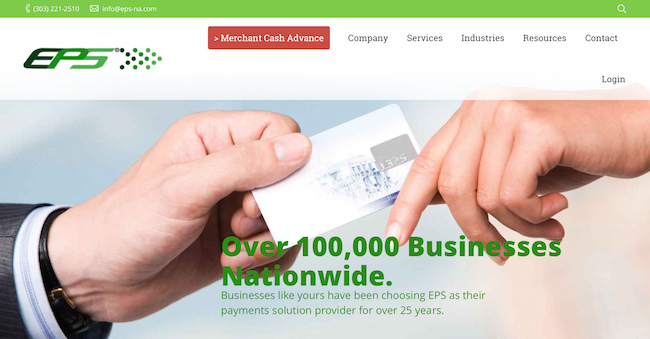
Electronic Payment Systems is one of the nation’s oldest and largest privately held merchant service providers of electronic payment products to businesses and ISO’s. They provide a comprehensive suite of merchant processing solutions, high levels of data security, and expertise for all business types, including retailers, restaurants, hotels, automotive, healthcare, service businesses, e-Commerce and non-profit organizations.
Electronic Payment Systems vs. Due: Electronic Payment Systems and Due both offer payment processing solutions for businesses of all sizes. Electronic Payment Systems offers more direct solutions by industry, as well as a much wider variety of merchant specific solutions. Due offers a very basic set of features such as Due offers features such as time tracking, digital wallet, project management, invoicing, and much more for free.
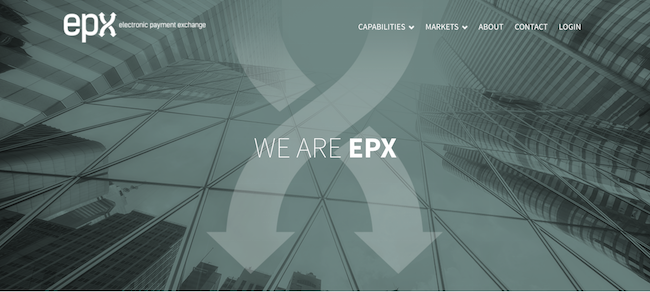
EPX is an international payments company that offers credit card, debit card, and eCheck (ACH) processing, e-commerce payment processing, virtual terminal, mobile payments and comprehensive reporting to help merchants and retailers all over the world.
EPX vs. Due: Both Due and EPX offer credit card, debit card, and ACH processing services to businesses of all sizes. EPX offers POS systems while Due only offers e-commerce solutions at the moment. EPX allow users to create a pay-page for their online business while Due allows users to integrate a hosted checkout to their already existing platform. Due offers additional features such as payment processing, time tracking, digital wallet, project management, invoicing, and much more.

Consumers can use their debit cards to send money to people through their Facebook Messenger app and not have to worry about transfering the funds to receive or send because it comes directly from a bank account.
Facebook Messenger vs. Due: Facebook Messenger allow users to link their cards to their Facebook account and send and receive payments. The transactions are always bank to bank. Due also allows users to send and receive payments via a linked debit and credit card or bank account. Due offers additional features such as payment processing, time tracking, digital wallet, project management, invoicing, and much more.

Fattmerchant is a flat-rate merchant services provider offering unlimited payment processing for no markups, no ancillary fees, and no contract. They remove the middleman and provide direct access to low-cost credit card processing for Visa, MasterCard, and American Express.
Fattmerchant vs. Due: Both Fattmerchant and Due offer a “no-middleman” credit card processing solution for businesses of all types. Fattmerchant offers both POS systems and an e-commerce checkout while Due is only online at the moment. Fattmerchant charges monthly fees starting at $69/month and $0.25 per transaction + interchange fees. Due charges 2.8% flat per transaction or lower depending on volume with no monthly or hidden costs. Due offers additional features such as payment processing, time tracking, digital wallet, project management, invoicing, and much more.

First Bankcard Processing offers merchant accounts for credit card processing as well as POS equipment, payment gateway, electronic invoicing, gift cards and more.
First Bankcard Processing vs. Due: Both First Bankcard Processing and Due offer payment processing solutions for businesses of all sizes. First Bankcard Processing offers both POS and e-commerce solutions while Due is only online at the moment. Due offers a hosted checkout that integrates into your already existing e-commerce platform. Due offers additional features such as payment processing, time tracking, digital wallet, project management, invoicing, and much more.

First Data offers payment solutions for small businesses like retail credit card processing; for large merchants like eCheck acceptance as well as debit and credit card processing; other industries and financial institutions for commercial payments. They also supply terminals and other types of financial products and solutions.
First Data vs. Due: Both First Data and Due offer payment processing solutions for businesses. First Data covers a much larger range of industry specific solutions. These industries include: global and national financial institutions, community financial institutions, and government institutions. They offer both POS and online processing while Due only offers an e-commerce solution. However Due is a much better option for small businesses. Due offers features such as payment processing, time tracking, digital wallet, project management, invoicing, and much more completely free of charge. Processing fees start as low as 2.8% or lower depending on volume. While First Data covers a larger range of industries, Due is a much more simplified solution for your business.

FIS Global is a financial solutions company that offers a payments platform for digital payments, enterprise payments, coporate payments, and credit and debit card processing. Other merchant solutions include payment gateways, apps, and equipment.
FIS Global vs. Due: Both FIS Global and Due offer payment processing solutions to businesses of all kinds. FIS Global also offers banking, wealth, and management consulting services to better exceed customer expectations. FIS Global focuses more on larger enterprises covering a huge range of industry specific solutions. On the payments side, they cover a similar range of solutions as Due. Due offers additional features such as payment processing, time tracking, digital wallet, project management, invoicing, and much more.

Flagship Merchant Services is an industry leader in offering credit card processing services to most business types. They have one of the largest credit card fraud, loss prevention and chargeback departments in the credit card processing industry.
Flagship Merchant Services vs. Due: Both Due and Flagship Merchant Services offer an e-commerce payment processing solution for businesses of all sizes. You can request a free quote online to get an idea of their rates. Due offers credit card processing at a flat 2.8% fee or lower depending on volume with no monthly or hidden costs. Due offers additional features such as time tracking, digital wallet, project management, invoicing, and much more.

Founded in 2007, Fortumo is a leading global provider of direct carrier billing. Fortumo payments cover 94 markets and connect merchants to subscribers of more than 350 mobile operator networks.
Fortumo vs. Due: Both Fortumo and Due offer payment processing options for a multitude of businesses. Both offer an optimized checkout experience, detailed reporting and analytics, as well as a recurring payments engine. Due offers additional features such as time tracking, digital wallet, project management, invoicing, and much more.

Go Emerchant is a payments processing company that offers EMV processing, mobile payments, iPad POS, a payment gateway, recurring billing, shopping cart capability and a QuickBooks plugin.
Go Emerchant vs. Due: Both Go Emerchant and Due offer payment processing capabilities such as online payments, mobile payments, recurring billing, and a shopping cart-plugin. Go Emerchant offers POS systems and EMV/Credit Card machines while Due does not yet have POS functionality in place. Due offers credit card processing at a flat 2.8% fee or lower depending on volume with no monthly or hidden costs. Due offers additional features such as time tracking, digital wallet, project management, invoicing, and much more.

Send money to anyone in the US using an email address or phone number. It’s fast, easy, and free to send directly from a debit card, bank account, or Wallet Balance.
Google Wallet vs. Due: Google Wallet and Due both allow users to send money for free across the platform either from a linked card, bank balance, or digital wallet balance. Due offers additional features such as payment processing, time tracking, hosted checkout for online businesses, project management, invoicing, and much more. Due offers credit card processing at a flat 2.8% fee or lower depending on volume with no monthly or hidden costs

Gravity Payments was created to help small businesses get the most transparent and fair pricing for credit card processing. The company now offers mobile payments, point of sale, gift and loyalty cards and working capital solutions.
Gravity Payments vs. Due: Both Gravity Payments and Due offer credit card processing, a hosted checkout for online businesses, reporting, and analytics for businesses of all sizes. Gravity Payments offers POS systems as well as gift and loyalty cards, while Due does not yet have this functionality in place. In order to get an idea of pricing, you’ll need to submit a quote to their sales team. Due offers a flat 2.8% fee or lower depending on volume for payment processing, no hidden or monthly fees. Due offers additional features such as, time tracking, digital wallet, project management, invoicing, and much more.

Harbortouch offers POS equipment and merchant services to accept a wide range of payment types, including all major debit and credit cards as well as EBT. They also offer other payment services like check services, cash advance, ATM, gift and loyalty programs, and an additional payment gateway through Authorize.net.
Harbortouch vs. Due: As far as payment processing goes, Harbortouch mainly focuses on POS systems while Due only offers an e-commerce solution at the moment. Due offers a flat 2.8% fee or lower depending on volume for payment processing, no hidden or monthly fees. Due offers additional features such as, time tracking, digital wallet, project management, invoicing, and much more.
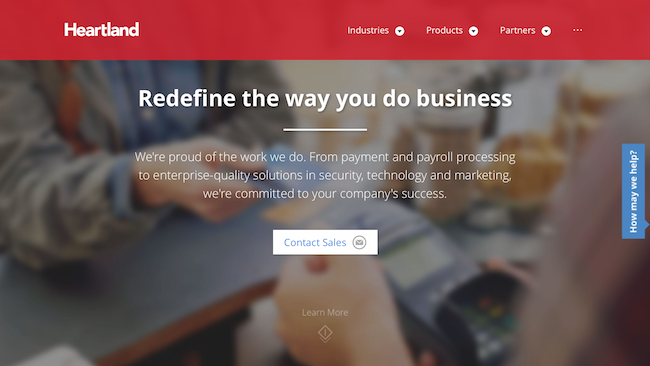
Heartland is one of the largest payment processors in the U.S, delivering card processing, security technology, and more to businesses and educational institutions.
Heartland vs. Due: Both Heartland and Due offer online payment processing, payroll, and billing solutions for businesses of all sizes. Heartland offers a much more industry specific suite of features, as well as POS systems which Due does not yet offer. If you want to inquire about rates, submit a quote online with Heartland. Due offers a flat 2.8% fee or lower depending on volume for payment processing, no hidden or monthly fees. Due offers additional features such as, time tracking, digital wallet, project management, invoicing, and much more.

Intuit Payments works with Quickbooks Online to accept payments from customers, including through mobile and desktop versions. Features include a free card reader, automatic updates with Quickbooks when payments are received, and the ability to accept credit cards like Visa, Mastercard, Discover, and American Express.
Intuit Payments vs. Due: Intuit Payments offers payment processing through Quickbooks payments. Through this you can accept payments on any device. If you want to pay as you go, the prices are 2.4% + $0.25 per transaction for swiped cards, 3.4% + $0.25 for keyed cards, and $0.50 per ACH transfer. Due offers a flat 2.8% fee or lower on payment processing depending on volume and ACH transfers are completely free. Due offers additional features such as, time tracking, digital wallet, project management, and much more.

iPayment offers a full range of payment solutions, including EMV and NFC contactless acceptance, gift and loyalty programs, ecommerce tools, retail solutions, cash advance programs, and pay at the pump platforms.
iPayment vs. Due: Both Due and iPayment offer e-commerce payment processing options for businesses of all sizes, iPayment has POS systems and retail options in place while Due does not yet have that functionality. iPayment also offers gift and loyalty and business loans to their customers. If you want to get a quote for processing rates, you must submit an inquiry online. Due offers a flat 2.8% fee or lower on payment processing depending on volume and ACH transfers are completely free. Due offers additional features such as, time tracking, digital wallet, project management, and much more.
Leaders Merchant Services

Leaders Merchant Services is a California-based company which specializes in credit and debit card processing for companies of all sizes. Their payment processing services enable merchants to process both traditional card-present or “swiped” transactions as well as card-not-present, or “keyed” transactions.
Leaders vs. Due: Leaders offers both online and in-store payment processing services, while Due only offers an e-commerce solution at the moment. If you want to get a quote for processing rates, you must submit an inquiry online. Due offers a flat 2.8% fee or lower on payment processing depending on volume and ACH transfers are completely free. Due offers additional features such as, time tracking, digital wallet, invoicing, project management, and much more.

Leap Payments is a credit card processing company that also offers mobile card readers and credit card machines for a diverse number of industries.
Leap Payments vs. Due: Leap Payments offers both online and in-store payment processing services, while Due only offers an e-commerce solution at the moment. If you want to get a quote for processing rates, you must submit an inquiry online. Due offers a flat 2.8% fee or lower on payment processing depending on volume and ACH transfers are completely free. Due offers additional features such as, time tracking, digital wallet, invoicing, project management, and much more.

LevelUp offers one-touch mobile payments and loyalty cards that your customers as well as rich analytics, processing savings and ROI-driven campaigns.
LevelUp vs. Due: Both Due and LevelUp offer payment processing solutions of some kind. LevelUp focuses mostly on mobile software solutions for industry specific use cases. Their target customer is restaurants, and assist with features such as ordering ahead, in-store payments, and providing actionable analytics and data. Due offers a flat 2.8% fee or lower on payment processing depending on volume and ACH transfers are completely free. Due offers additional features such as, time tracking, digital wallet, invoicing, project management, and much more.

Mastercard is a technology company in the global payments industry that operates the world’s fastest payments processing network, connecting consumers, financial institutions, merchants, governments and businesses in more than 210 countries and territories.
Mastercard vs. Due: Mastercard provides the infrastructure for companies of all sizes to utilize several payment processing technologies to improve their business. Both Due and Mastercard offer payment processing capabilities. You can see what Mastercard charges for interchange fees online. Due offers a flat 2.8% fee or lower on payment processing depending on volume and ACH transfers are completely free. Due offers additional features such as, time tracking, digital wallet, invoicing, project management, and much more.
Maverick Bank Card

Maverick Bank Card processes all types of credit cards in-store and online as well as offers merchant funding and cash advance, payment gateways, gift cards and loyalty card programs, check and ACH processing, POS equipment, and fraud and chargeback prevention tools.
Maverick Bank Card vs. Due: Both Due and Maverick Bank Card offer payment processing options for businesses of all sizes. Maverick Bank Card offers processing through several payment gateways. Due offers credit card processing directly from the platform. Maverick Bank Card fees on processing depending on which processor you decide on. Due offers a flat 2.8% fee or lower on payment processing depending on volume and ACH transfers are completely free. Due offers additional features such as, time tracking, digital wallet, invoicing, project management, and much more.

Merchant e-Solutions offers international credit card processing online, in-person, and mobile for all types of industries, including retail and hospitality.
Merchant e-Solutions vs. Due: Merchant e-Solutions and Due both offer online payment processing for businesses of all types. Merchant e-Solutions offers brick and mortar payment processing and offers industry specific solutions. Due offers additional features such as, time tracking, digital wallet, invoicing, project management, and much more.

Merchant One offers debit and credit card processing for small businesses, including all the major cards as well as a free credit card reader, simple pricing, no contract and no hidden fees.
Merchant One vs. Due: Merchant e-Solutions and Due both offer online payment processing for businesses of all types. Merchant e-Solutions also offers POS systems, cash advances, and gift/reward cards which Due does not yet have in place. Due offers other features such as, time tracking, digital wallet, invoicing, project management, and much more. To get an idea of pricing you have to submit a quote online with Merchant One. Due charges a flat 2.8% or lower for payment processing depending on volume with no hidden or monthly fees.

Moneris Solutions offers a wide range of payment platforms and technology, including countertop and wireless terminals, mobile and tablet versions, online payments, in-app payments, and self-serve and kiosk. They also provide currency conversion as well as gift and loyalty programs.
Moneris vs. Due: Moneris and Due both offer online payment processing for businesses of all types. Moneris offers industry specific solutions as well as POS systems which Due does not yet have in place. Due offers other features such as, time tracking, digital wallet, invoicing, project management, and much more. To get an idea of pricing you have to submit a quote online with Moneris. Due charges a flat 2.8% or lower for payment processing depending on volume with no hidden or monthly fees.

National Bankcard is a payment processing company that handles terminal, mobile, online and POS processing for debit and credit cards, chip and EMV cards, loyalty and gift cards, cash advance and check services. It also offers online reporting and QuickBooks integration.
National Bankcard vs. Due: National Bankcard and Due both offer online payment processing, check services, and reporting for businesses of all types. National Bankcard also offers POS systems, cash advances, and gift/reward cards which Due does not yet have in place. Due offers other features such as, time tracking, digital wallet, invoicing, project management, and much more. To get an idea of pricing you have to submit a quote online with National Bankcard. Due charges a flat 2.8% or lower for payment processing depending on volume with no hidden or monthly fees.

National Merchant Services offers credit and debit card processing, gift and loyalty cards, check acceptance, EBT, business financing and merchant analytics.
National Merchant Services vs. Due: National Merchant Services and Due both offer online payment processing, check services, and reporting for businesses of all types. National Bankcard is partnered with various other services and gateway’s to provide virtual terminals and POS systems which Due does not yet have in place. Due offers other features such as, time tracking, digital wallet, invoicing, project management, and much more. To get an idea of pricing you have to submit a quote online with National Bankcard. Due charges a flat 2.8% or lower for payment processing depending on volume with no hidden or monthly fees.

National Processing is an ACH, credit card, check and online payment processing company that focuses on service, rates, software and quick setup.
National Processing vs. Due: Both National Processing and Due offer ACH transfer and payment processing capabilities for businesses of all sizes. National Processing charges $15/month + $0.24 per ACH transfer and $2/month + 2.7% + $0.20 per transaction for payment processing. Due charges a flat 2.8% fee or lower on payment processing depending on volume and ACH transfers are completely free. Due offers additional features such as, time tracking, digital wallet, invoicing, project management, and much more.

PayAnywhere helps a company accept credit cards with their iPhone, iPad and Android with PayAnywhere Mobile or by using PayAnywhere Storefront.
PayAnywhere vs. Due: PayAnywhere only offers mobile reader and storefront payment processing solutions while Due only offers online payment processing options at the moment. Due charges a flat 2.8% fee or lower on payment processing depending on volume and ACH transfers are completely free. Due offers additional features such as, time tracking, digital wallet, invoicing, project management, and much more.

PayCircle enables users to pay each other and trade through various means through text or email. The company also offers a range of payment processing solutions.
PayCircle vs. Due: Both PayCircle and Due allow users to send, receive, and process payments. To get an idea of pricing you must submit a quote with PayCircle. Due charges a flat 2.8% fee or lower on payment processing depending on volume and ACH transfers are completely free. Due offers additional features such as, time tracking, digital wallet, invoicing, project management, and much more.

Pay Junction helps mid to large-scale businesses with payments, offering swipe card, ship card, e-check, NFC phone, and Apple Watch as well as electronic signature capture, digital receipts, multiple users and locations, and comprehensive reporting.
Pay Junction vs. Due: Both Pay Junction and Due offer payment processing and reporting functionality to businesses of all sizes. Pay Junction is primarily focused on mid to large scale businesses, since they are able to charge competitive rates, they require larger volumes. Due offers the same rate no matter how small the business. Take a look at the Pay Junction website to see how their rates stack up. Due charges 2.8% or lower for credit card processing depending on volume with no hidden or monthly fees. ACH transfers and all other features on Due are completely free. These features include: time tracking, digital wallet, invoicing, project management, and much more.

PayLeap provides the ability to accept debit and credit cards through face-to-face payments, mobile payments, and e-commerce payments as well as phone orders. They offer other services and features for merchants and developers.
PayLeap vs. Due: Both PayLeap and Due offer payment processing options catered to small businesses and online stores. PayLeap offers in-store payments while Due does not yet have that functionality in place. PayLeap charges 2.89% + $0.29 per transaction + $19.99 a month to access their payment processing capabilities. Due charges 2.8% or lower for credit card processing depending on volume with no hidden or monthly fees. ACH transfers and all other features on Due are completely free. These features include: time tracking, digital wallet, invoicing, project management, and much more.

Payline Data is a full-service merchant processing company for any size business. They are proud to donate a portion of our profits to charity.
Payline Data vs. Due: Both Payline Data and Due offer payment processing options. Payline Data offers in-store payments while Due does not yet have that functionality in place. Payline Data charges interchange fees + 0.35% + $0.10 per transaction + $15 a month to process payments online. Due charges 2.8% or lower for credit card processing depending on volume with no hidden or monthly fees. ACH transfers and all other features on Due are completely free. These features include: time tracking, digital wallet, invoicing, project management, and much more.

Payment Depot provides wholesale credit card processing to all businesses and estimates that it saves businesses 40% per month.
Payment Depot vs. Due: Payment Depot and Due both offer credit card processing functionality to a large suite of businesses. Payment Depot offers a wholesale solution, meaning it processes payments directly with the credit card providers. Due offers it’s own credit card processing solution. Payment Depot offers a tiered pricing structure. At the very basic level they charge interchange + $0.25 per transaction + $29/month. Due charges 2.8% or lower for credit card processing depending on volume with no hidden or monthly fees. ACH transfers and all other features on Due are completely free. These features include: time tracking, digital wallet, invoicing, project management, and much more.

PayPal offers a convenient and safe way to pay vendors, friends, and family through linking to a bank account or debit or credit card.
PayPal vs. Due: PayPal and Due both allow users to send, receive, and process payments online. In addition, they both offer invoicing and digital wallet functionality. PayPal offers mobile card readers and POS systems which Due does not yet have in place. PayPal charges 2.9% + $0.30 per transaction with no hidden or monthly fees for processing. Due charges 2.8% or lower for credit card processing depending on volume with no hidden or monthly fees. ACH transfers and all other features on Due are completely free. These features include: time tracking, reporting, recurring billing, project management, and much more.
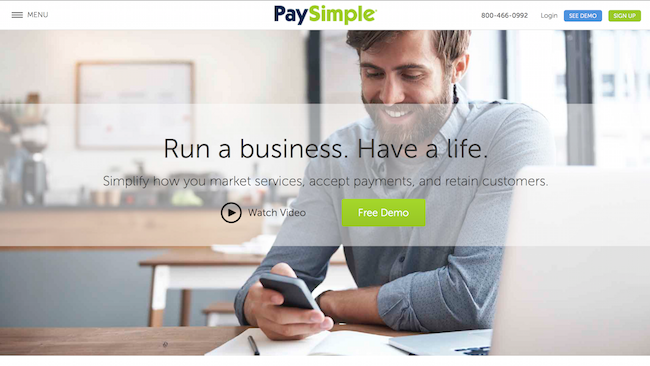
PaySimple offers a way to receive payments from customers through ACH/eCheck and credit card processing for one price. They also offer customization, recurring billing, and automatic receipts.
PaySimple vs. Due: Both PaySimple and Due offer ACH/eCheck, payment processing, recurring billing, and online payment functionality to businesses of all sizes. PaySimple has a tiered pricing structure. For the basic package PaySimple charges $49.95 a month + transaction fees + applicable taxes. Due charges 2.8% or lower for credit card processing depending on volume with no hidden or monthly fees. ACH transfers and all other features on Due are completely free. These features include: time tracking, reporting, recurring billing, project management, and much more.

Planet Payment delivers innovative payment processing, including gateway processing and multi-currency solutions to numerous countries all overt the world as well as credit card processing and merchant solutions.
Planet Payment vs. Due: Planet Payment and Due both offer payment processing capabilities to a multitude of businesses types. Planet Payment offers a gateway solution that is catered to specific industries and currencies. Due offers a direct processing solution that can fit the needs of businesses of all sizes.

Popmoney is a personal payment service that eliminates the need for checks and cash. Sending, requesting, and receiving money is as easy as emailing and texting family or friends.
Popmoney vs. Due: Popmoney allows users to send money to other users on the platform as easy as sending a text. This credit card processing company allows money transfers from bank to bank with a $0.95 fee. Due offers this same functionality, but ACH transfers are completely free. You can link a credit card, debit card, or bank to your Due account to send money. Due offers additional features such as payment processing, reporting, time tracking, digital wallet, invoicing, project management, and much more.

Poynt is a payments terminal that allows merchants to accept all types of payments, including ApplePay, chip and magnetic stripe cards as well as gift cards, QR, and loyalty cards.
Poynt vs. Due: Poynt offers an in-store payment terminal as well as a mobile chip reader that allows customers to process payments including Apple Pay and loyalty cards. Due only offers payment processing solutions for online businesses at the moment. Due offers additional features such as online payments, reporting, time tracking, digital wallet, invoicing, project management, and much more.

Priority Payment Systems offers a unique payment solutions platform that includes mobile payments, Quickbooks integration, ACH transactions, Apple Pay, e-commerce and website development tools, invoicing and recurring billing, restaurant ordering, medical payments, inventory, and terminals and other POS equipment.
Priority Payment Systems vs. Due: Priority Payment Systems offers a huge suite of payment processing and merchant solutions for businesses of all sizes. Both Due and Priority Payment Systems offer ACH transfers, e-commerce processing, invoicing, and recurring billing. Priority Payment Systems offers POS systems and terminals which Due does not yet have in place. To get an idea of pricing, you can put together a custom solution for your business and submit a quote. Due charges 2.8% or lower for credit card processing depending on volume with no hidden or monthly fees. ACH transfers and all other features on Due are completely free.

ProPay is a processing company that provides a way to accept credit cards anywhere at anytime, including a card reader, app, or desktop application. It offers flexible merchant services and provides a way to make payments globally, working with multiple currencies. It also can be used with Quickbooks.
ProPay vs. Due: ProPay and Due both offer online payment processing solutions for businesses of all sizes. ProPay offers more industry specific solutions with a much larger suite of features and integrations than Due. However, Due offers a very simple set of features that encompass all the needs of a business for free. Due charges a flat 2.8% or lower for payment processing with no hidden monthly fees. ACH transfers and all other features are offered for free. These features include: online payments, reporting, time tracking, digital wallet, invoicing, project management, and much more.

RedFynn helps small businesses with their payments, including offering a host of POS systems, payment gateways, terminals and virtual terminals for all types of businesses and industries.
RedFynn vs. Due: RedFynn and Due both offer online payment processing solutions for businesses of all sizes. RedFynn offers more industry specific solutions as well as POS systems which Due does not yet have in place. RedFynn offers processing through a payment gateway so pricing may vary. Due offers a very simple set of features that encompass all the needs of a business for free. Due charges a flat 2.8% or lower for payment processing with no hidden monthly fees. ACH transfers and all other features are offered for free. These features include: online payments, reporting, time tracking, digital wallet, invoicing, project management, and much more.

Regal Payment Systems offers POS equipment, including credit card terminal. Their merchant services include mobile payments, check acceptance, gift and loyalty card programs, and a payment gateway through Authorize.net. They focus on evolving payment technologies and providing PCI compliance.
Regal Payment Systems vs. Due: Regal Payment Systems and Due both offer online payment processing solutions for businesses of all sizes. Regal Payment Systems offers more industry specific solutions as well as POS systems and gift/loyalty card programs which Due does not yet have in place. Regal Payment Systems offers processing through Authorize.net, feel free to reference them for pricing. Due offers a very simple set of features that encompass all the needs of a business for free. Due charges a flat 2.8% or lower for payment processing with no hidden monthly fees. ACH transfers and all other features are offered for free. These features include: online payments, reporting, time tracking, digital wallet, invoicing, project management, and much more.

Rev Worldwide has created a global payments network with innovative payment solutions that adapt to local currencies and languages. They also offer mobile payment solutions for a wide range of industries.
Rev Worldwide vs. Due: Rev Worldwide focuses more on international payment capabilities as well as mobile payment options. Due offers a very simple set of features that encompass all the needs of a business for free. Due charges a flat 2.8% or lower for payment processing with no hidden monthly fees. ACH transfers and all other features are offered for free. These features include: payment processing, online payments, reporting, time tracking, digital wallet, invoicing, project management, and much more.

Samsung Pay turns a Galaxy device into a wallet, holding debit and credit cards, loyalty cards, membership cards, and gift cards to use at checkout in the most locations in the world. Businesses can attract more customers by offering this payment option.
Samsung Pay vs. Due: Samsung Pay allows you to link several cards to your smartphone and make payments from any card via your device. Due offers similar functionality by providing users with a digital wallet in which they can make payments with. Due only allows users to make payments online at the moment, with in-store capabilities on the roadmap. Due offers additional features such as payment processing, time tracking, reporting, invoicing, project management, and much more.

Known for offering online stores for merchants and companies, Shopify Payments offers a payments solution to expand the type of payments that can be accepted and made. Features include POS slution, a buy button, social buy buttons, and credit card acceptance with no third-party account requirements.
Shopify Payments vs. Due: Shopify and Due both offer an e-commerce solution for payment processing. Shopify offers POS systems and in-store payment acceptance which Due does not yet offer. Due offers additional features such as payment processing, time tracking, reporting, invoicing, project management, and much more.

ShopKeep is an iPad POS system that ofers a low integrated payment processing rate and accepts Apple Pay in addition to debit and credit cards.
ShopKeep vs. Due: ShopKeep offers an in-store payment processing system through IOS. They guarantee a low integrated processing rate and monthly fees start at $69/month for a single register. Due only offers an e-commerce payment processing solution at the moment. Due charges a flat 2.8% or lower for payment processing with no hidden monthly fees. ACH transfers and all other features are offered for free. These features include: online payments, reporting, time tracking, digital wallet, invoicing, project management, and much more.

Skrill is a London-based digital payments company that is developing global payment solutions for businesses and consumers, including making it easier to send money to family and friends using just an email address and password.
Skrill vs. Due: Both Skrill and Due allow you to link a credit card, debit card, and bank account to the platform and send money only using an email address. Both Skrill and Due also have a digital wallet which allows you to hold money on your account and make instant payments with your account balance. Due offers additional features such as payment processing, time tracking, reporting, invoicing, project management, and much more.

Snapcash, created in partnership with Square, is a fast way for Snapchatters to exchange money within the Chat feature. Once Snapchat users have linked their debit card in the app, they can send Snapcash to anyone in their contact list who is eligible to receive Snapcash.
Snapcash vs. Due: Both Snapcash and Due allow users to send money to other users on the platform. In order to send money on Due, all you need is the end-user’s email address. Snapcash only allows you to send money to other users on the app, and only if they have opted to accept Snapcash. Due offers additional features such as payment processing, time tracking, reporting, digital wallet, invoicing, project management, and much more.

Now a part of Capital One, Spark is a platform that helps people build online stores, including accept payments online, as well as assists merchants with in-store payments with a mobile app and card reader, giving customers multiple ways to pay.
Spark vs. Due: Spark and Due both offer online payment processing solutions for businesses of all sizes. Spark offers POS systems, tax planning, and business IQ which Due does not yet have in place. Due offers a very simple set of features that encompass all the needs of a business for free. Due charges a flat 2.8% or lower for payment processing with no hidden monthly fees. ACH transfers and all other features are offered for free. These features include: online payments, reporting, time tracking, digital wallet, invoicing, project management, and much more.

Square creates tools that help sellers of all sizes start, run, and grow their businesses. Square’s point-of-sale service offers tools for every part of running a business, from accepting credit cards and tracking inventory, to real-time analytics and invoicing. It also offers Square Cash for payments.
Square vs. Due: Square and Due both allow process payments online and access company analytics through a back-end dashboard. Square offers mobile card readers and POS systems which Due does not yet have in place. Square’s pricing depends on how you accept the cards (keyed, swiped, tapped, etc..), reference the website for more information. Due charges 2.8% or lower for credit card processing depending on volume with no hidden or monthly fees. ACH transfers and all other features on Due are completely free. These features include: time tracking, reporting, recurring billing, project management, and much more.

Stripe is the world’s largest developer-oriented commerce company, helping small and large companies accept web and mobile payments.
Stripe vs. Due: Stripe and Due both offer online payment and payment processing capabilities for businesses of all sizes. Stripe is more oriented to the developer audience and provides a multitude of API’s for a suite of payment use-cases. Stripe charges 2.9% + $0.30 per transaction for payment processing. Due charges 2.8% or lower for credit card processing depending on volume with no hidden or monthly fees. ACH transfers and all other features on Due are completely free. These features include: time tracking, reporting, recurring billing, project management, and much more.

Swift Pay Systems offers credit card processing through a monthly membership that delivers direct access to interchange rates for processing. They also offer no contracts, equipment for processing, and technical support.
Swift Pay Systems vs. Due: Both Swift Pay Systems and Due offer payment processing for businesses of all sizes. Swift Pay Systems charges monthly fees starting at $39/month + $0.19 per transaction for the 10k monthly limit for volume. Due charges 2.8% or lower for credit card processing depending on volume with no hidden or monthly fees. ACH transfers and all other features on Due are completely free. These features include: time tracking, reporting, recurring billing, project management, and much more.

Tipalti is an automated global mass payment system redefines how online ad networks, affiliate networks, crowdsourcing and online market-places pay their partners.
Tipalti vs. Due: Tipalti and Due both offer payment functionality to businesses of all sizes. Tipalti is focused more on larger companies and offers industry specific solutions. They specialize in offering custom solutions to redefine the account payables process for businesses. Due offers a very simple set of features that encompass all the needs of a business for free. Due charges a flat 2.8% or lower for payment processing with no hidden monthly fees. ACH transfers and all other features are offered for free. These features include: online payments, reporting, time tracking, digital wallet, invoicing, project management, and much more.

Total Merchant Services helps a business accept all payment types anywhere, including Apple Pay, Google Wallet, NFC, gift and chip cards, debit and credit cards and Android Pay. It offers terminal and card readers, POS< online payment solutions, financing, and mraketing, including loyalty cards. It also helps businesses become EMV compliant.
Total Merchant Services vs. Due: Total Merchant Services and Due both offer an e-commerce solution for payment processing. Total Merchant Services offers POS systems and in-store payment acceptance which Due does not yet offer. Due offers additional features such as payment processing, time tracking, reporting, invoicing, project management, and much more.

TransFirst is one of the leading providers of secure payment processing in the U.S. and provides merchant services and products that can help businesses of all sizes.
TransFirst vs. Due: TransFirst and Due both offer an e-commerce solution for payment processing. TransFirst offers POS systems and in-store payment acceptance which Due does not yet offer. TransFirst is focused on industry specific and integrated solutions for larger scale companies. Due offers a very simple set of features that encompass all the needs of a business for free. Due charges a flat 2.8% or lower for payment processing with no hidden monthly fees. ACH transfers and all other features are offered for free. These features include: online payments, reporting, time tracking, digital wallet, invoicing, project management, and much more.
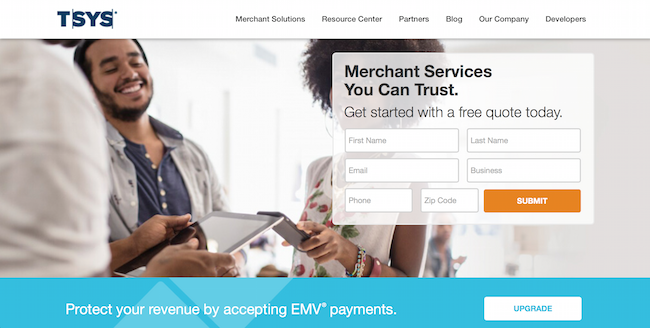
TSYS Merchant Solutions provides seamless, secure, and innovative solutions across the payments spectrum, including issuer bank processing, merchant acquiring, and prepaid program management.
TSYS vs. Due: Both TSYS and Due offer merchant solutions for businesses of all sizes. To get an idea of pricing, you need to submit a quote online with TSYS. TSYS offers POS systems while Due is only online at the moment. Due offers a very simple set of features that encompass all the needs of a business for free. Due charges a flat 2.8% or lower for payment processing with no hidden monthly fees. ACH transfers and all other features are offered for free. These features include: online payments, reporting, time tracking, digital wallet, invoicing, project management, and much more.

Vantiv is a payments company that offers in-store and online payment options to help many types of businesses and organizations offer options for their customers. They feature terminals, POS systems, and the ability to accept debit and credit card payments, mobile payments, gift cards, prepaid cards, and ACH and eCheck. They handle domestic and international payment processing.
Vantiv s. Due: Both Due and Vantiv offer online payments, ACH/eCheck acceptance, and payment processing. Vantiv offers POS systems, gift cards, and prepaid cards which Due does not yet have in place. Due offers a very simple set of features that encompass all the needs of a business for free. Due charges a flat 2.8% or lower for payment processing with no hidden monthly fees. ACH transfers and all other features are offered for free. These features include: online payments, reporting, time tracking, digital wallet, invoicing, project management, and much more.

Venmo is a digital wallet that lets people make and share payments with their friends.
Due vs. Venmo: Both Venmo and Due allow you to link a credit card, debit card, and bank account to the platform and send money only using an email address. Both Venmo and Due also have a digital wallet which allows you to hold money on your account and make instant payments with your account balance. Due offers additional features such as payment processing, time tracking, reporting, invoicing, project management, and much more.

Visa is a global payments technology company working to enable consumers, businesses, banks and governments to use digital currency.
Visa vs. Due: Visa provides the infrastructure for companies of all sizes to utilize several payment processing technologies to improve their business. Both Due and Visa offer payment processing capabilities. You can see what Visa charges for interchange fees online. Due offers a flat 2.8% fee or lower on payment processing depending on volume and ACH transfers are completely free. Due offers additional features such as, time tracking, digital wallet, invoicing, project management, and much more.

WePay is a payments solution for group payments as well as a powerful payment option for crowdfunding sites, marketplaces, and business tools.
WePay vs. Due: Both Due and WePay provide payment options and business tools to businesses of all sizes. WePay provides industry specific solutions, mainly marketplaces and crowdfunding platforms. Due offers additional features such as, time tracking, digital wallet, invoicing, project management, and much more.

Western Union offers stores and an online portal to make payments, receive money, and pay bills. It also offers prepaid cards and money orders.
Western Union vs. Due: Both Due and Western Union allow users to send and receive payments with the click of a button. Due offers a very simple set of features that encompass all the needs of a business for free. Due charges a flat 2.8% or lower for payment processing with no hidden monthly fees. ACH transfers and all other features are offered for free. These features include: online payments, reporting, time tracking, digital wallet, invoicing, project management, and much more.
WooCommerce

WooCommerce is one of the world’s most popular e-commerce platforms that integrates a wide range of payment options.
WooCommerce: Both Due and WooCommerce offer e-commerce payment processing options for businesses of all sizes. Due offers a very simple set of features that encompass all the needs of a business for free. Due charges a flat 2.8% or lower for payment processing with no hidden monthly fees. ACH transfers and all other features are offered for free. These features include: online payments, reporting, time tracking, digital wallet, invoicing, project management, and much more.
WorldPay

WorldPay is a global payments processing platform that works for small to medium sized businesses, digital businesses, and enterprise businesses, enabling businesses to accept all types of payments, including mobile payments.
WorldPay vs. Due: WorldPay and Due both enable businesses of all sizes to utilize a suite of payment features. WorldPay focuses mostly on international markets and currencies while Due is currently focused on payments in the United States. Due offers a very simple set of features that encompass all the needs of a business for free. Due charges a flat 2.8% or lower for payment processing with no hidden monthly fees. ACH transfers and all other features are offered for free. These features include: online payments, reporting, time tracking, digital wallet, invoicing, project management, and much more.

Yoozy offers credit card processing, check processing, POS equipment, mobile payments, NFC mobile wallet, loyalty and marketing solutions, gift cards, online solutions, cash advances and consulting for small businesses.
Yoozy vs. Due: Both Due and Yoozy offer online payments, ACH/eCheck acceptance, and payment processing. Yoozy offers POS systems, gift cards, and prepaid cards which Due does not yet have in place. Due offers a very simple set of features that encompass all the needs of a business for free. Due charges a flat 2.8% or lower for payment processing with no hidden monthly fees. ACH transfers and all other features are offered for free. These features include: online payments, reporting, time tracking, digital wallet, invoicing, project management, and much more.

